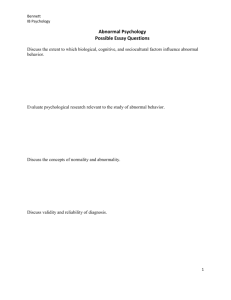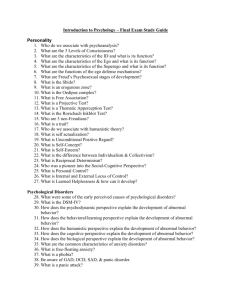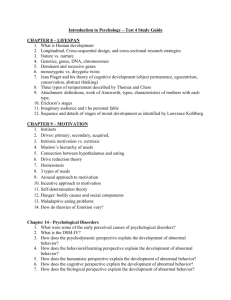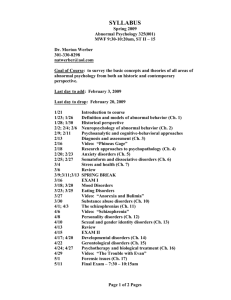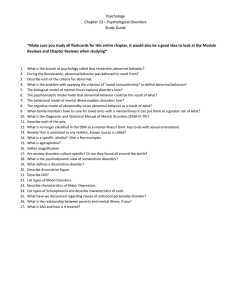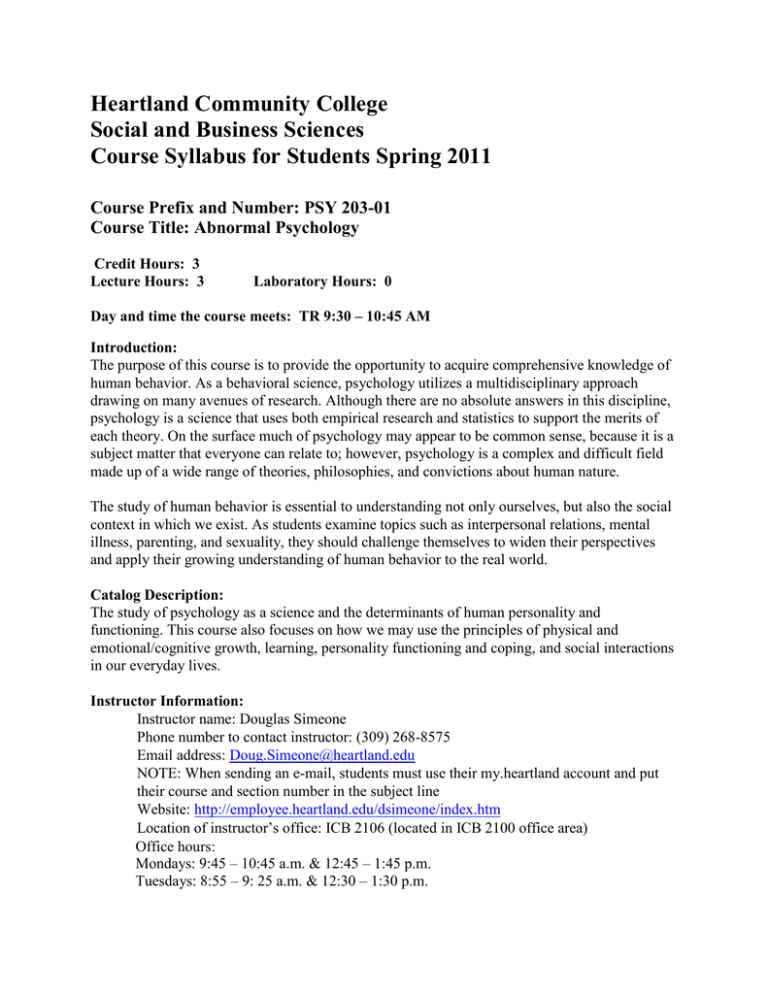
Heartland Community College
Social and Business Sciences
Course Syllabus for Students Spring 2011
Course Prefix and Number: PSY 203-01
Course Title: Abnormal Psychology
Credit Hours: 3
Lecture Hours: 3
Laboratory Hours: 0
Day and time the course meets: TR 9:30 – 10:45 AM
Introduction:
The purpose of this course is to provide the opportunity to acquire comprehensive knowledge of
human behavior. As a behavioral science, psychology utilizes a multidisciplinary approach
drawing on many avenues of research. Although there are no absolute answers in this discipline,
psychology is a science that uses both empirical research and statistics to support the merits of
each theory. On the surface much of psychology may appear to be common sense, because it is a
subject matter that everyone can relate to; however, psychology is a complex and difficult field
made up of a wide range of theories, philosophies, and convictions about human nature.
The study of human behavior is essential to understanding not only ourselves, but also the social
context in which we exist. As students examine topics such as interpersonal relations, mental
illness, parenting, and sexuality, they should challenge themselves to widen their perspectives
and apply their growing understanding of human behavior to the real world.
Catalog Description:
The study of psychology as a science and the determinants of human personality and
functioning. This course also focuses on how we may use the principles of physical and
emotional/cognitive growth, learning, personality functioning and coping, and social interactions
in our everyday lives.
Instructor Information:
Instructor name: Douglas Simeone
Phone number to contact instructor: (309) 268-8575
Email address: Doug.Simeone@heartland.edu
NOTE: When sending an e-mail, students must use their my.heartland account and put
their course and section number in the subject line
Website: http://employee.heartland.edu/dsimeone/index.htm
Location of instructor’s office: ICB 2106 (located in ICB 2100 office area)
Office hours:
Mondays: 9:45 – 10:45 a.m. & 12:45 – 1:45 p.m.
Tuesdays: 8:55 – 9: 25 a.m. & 12:30 – 1:30 p.m.
Wednesday: 12:45 – 1:45 p.m.
Thursday: 1:15 – 1:45 p.m.
Textbook:
Required:
Nevid, Rathus & Greene. (2008) Abnormal Psychology in a Changing
World. 7th Ed. Upper Saddle River, NJ. Pearson Prentice Hall.
Relationship to Academic Development Programs and Transfer:
This course fulfills 3 of the 9 semester hours of credit in Social Sciences required for the A.A. or
A.S. degree. This course should transfer as part of the General Education Core Curriculum
described in the Illinois Articulation Initiative to other Illinois colleges and universities
participating in the IAI. However, students should consult an academic advisor for transfer
information regarding particular institutions. Refer to the IAI web page at www.itransfer.org for
more information.
Course Objectives (Learning Outcomes):
At the completion of this course, the student will be able to accomplish the following objectives:
1.
2.
3.
4.
5.
6.
7.
8.
9.
10.
11.
12.
13.
14.
15.
16.
Misconceptions of abnormal behavior popularly held.
Major scientific methodologies involved in researching abnormal behavior.
Historical context for attitudes and beliefs concerning abnormal behavior.
Knowledge of basic tenets of biological, psychosocial and sociocultural
viewpoints of behavior.
The role of stress in maladaptive behavior categories of stressors and coping
strategies.
Knowledge of anxiety based disorders as viewed from the psychodynamic,
learning, cognitive and biological perspectives.
Understanding of the relationship between psychological and biological factors
in illness.
Recognition of personality disorders, which are socially maladaptive.
Awareness of affective disorders and conditions influencing mood.
Information regarding schizophrenic disorders.
Substance abuse and other addictive disorders.
Symptoms and problems associated with organic brain disorders and mental
retardation.
Review of psychological disturbances of childhood and adolescence.
The clinical assessment and techniques used to determine the nature and severity
of maladaptive behavior.
Therapies utilized in the treatment of mental disorder.
An understanding of social measures for the prevention and amelioration of
psychological disorders.
-
-
Course/Lab Outline:
The following is a very brief outline of the most basic topics every instructor teaching the course
will include. There will of course be additional topics; each instructor may vary in these topics,
as well as how much time is spent on each topic.
1. Introduction and Methods of Research
a. Defining Abnormal Behavior
b. Historical Views of Abnormal Behavior
c. Research Methods in Abnormal Psychology
2. Contemporary Theoretical Perspectives
a. Psychodynamic Perspectives
b. Cognitive Perspectives
c. Humanistic and Sociocultural Perspectives
d. Biological Perspectives
3. Classification and Assessment of Abnormal Behavior
a. DSM
b. Assessment Testing
c. Reliability and Validity
4. Therapy and Treatment
a. Psychodynamic Therapies
b. Humanistic Therapies
c. Cognitive Therapies
d. Behavioral Therapies
e. Biological Therapies
d. Group and Family Therapies
5. Stress and Coping
a. Stress and Health
b. Biological and Psychological Factors
6. Anxiety disorders
a. Panic Disorder
b. Generalized Anxiety Disorder
c. Phobias
7. Dissociative and Somatoform disorders
a. Dissociative Amnesia
b. Dissociative Fugue
c. Depersonalization Disorder
d. Dissociative Identity Disorder
e. Conversion Disorder
f. Somatoform Disorders
8. Mood disorders and Suicide
a. Major Depressive Disorder
b. Bipolar Disorder
c. Suicide
9. Personality disorders
a. Antisocial Personality Disorder
b. Schizoid and Schizotypal Personality Disorders
c. Histrionic and Narcissistic Personality Disorders
10. Substance-related disorders
a. Abuse and Dependence
b. Alcoholism
c. Other Drug Addictions
11. Eating Disorders, Obesity, and Sleep Disorders
a. Anorexia and Bulimia Nervosa
b. Causes of Obesity
c. Dyssomnias and Parasomnias
12. Sexual and Gender Identity disorders
a. Gender Identity Disorder
b. Paraphilias
13. Schizophrenic and Psychotic disorders
a. Schizophrenia
b. Other Forms of Psychosis
14. Abnormal Behavior in Childhood and Adolescence
a. Risk Factors
b. Attention Deficit Disorder
c. Conduct Disorder
d. Mental Retardation
15. Cognitive Disorders
a. Alzheimer’s Disease
b. Other Medical Conditions
16. Violence and Abuse
a. Rape
b. Child Abuse
17. Contemporary and Legal Issues
a. Patient’s Rights
b. The Insanity Defense
c. Predicting and Preventing Psychological Disorders
Methods of Instruction:
Instructional methods for this course may include lecture, small group activities and the use
of videos.
Course Policies:
Method of Evaluation (Case Studies, Exams and Final Exam):
Case Studies: Students will be required to complete 10 case studies during the course of the
semester. Students will have to diagnose the disorder correctly, and discuss which
therapeutic techniques they would use if they were treating the patient, as well as discussing
in depth why they would use those techniques. Students not turning in case studies by their
due dates/time will receive a score of zero as late assignments will not be accepted. Students
will be given more information about these assignments as the semester progresses. Each
case study will be worth 20 points.
Total points = 200
Exams: Students will be given 3 exams during the course of the semester. Students will be
tested on material taken from the lectures as well as material from the text that I have not
lectured on. Each exam will be worth 50 points.
Total Points = 150
Make-up Exam Policy: Students missing class on an exam day must send me an e-mail
before class begins to let me know why they won’t be in class. Prior to making up the
exam students must provide appropriate written documentation (e.g., doctor’s note) as
to why the exam was missed. Students not following these guidelines will not be
permitted to make up the exam and will receive a score of zero.
The make-up exam will consist of 7 essay questions, of which the student will have to
respond to the 5 of his/her choice. The exam must be made up within 1 week of when the inclass exam was administered. Students who have not taken the make-up exam within the one
week time frame will receive a score of zero for the exam. Students who know ahead of time
that they won’t be in class for a scheduled exam can take the exam early, but must give me at
least 2 days notice prior to taking the exam. Students will be given at least 1 week’s notice
as to when an exam will be administered. Students can only make up one exam. Students
missing more than one exam will receive a score of zero on each additional exam missed.
Final Exam: There will be a comprehensive final exam worth 150 points. Missed final
exams cannot be made up, but they can be taken early if there is a valid reason for
doing so.
Total Possible Points = 150
Final Grade Determination: Students can earn up to 500 points in this class. The case
studies are worth 200 points. There are 3 exams, each worth 50 points, totaling 150 points.
The final exam is worth up to 150 points. Final grades will be determined as follows:
450 - 500 points earned = A (90-100%)
400 - 449 points earned = B (80-89%)
350 - 399 points earned = C (70-79%)
300 - 349 points earned = D (60-69%)
299 points earned and below = F (59% or lower)
Syllabi disclaimer:
It is possible that changes will occur in regard to the material covered during the course of the
semester. Changes will not be made in how the student’s final grade is determined.
Course Calendar:
PowerPoint Presentation
Week 1 & 2: Introduction and Methods of Research
Week 3: Contemporary Perspectives on Abnormal Behavior
Week 4: Classification and Assessment of Abnormal Behavior
Week 5: Methods of Treatment
Exam 1
Week 6: Stress, Psychological Factors and Health
Week 7: Anxiety Disorders
Text Reading
Chapter 1
Chapter 2
Chapter 3
Chapter 4
Chapter 5
Chapter 6
Week 8: Dissociative and Somatoform Disorders
Exam 2
Week 9: Mood Disorders and Suicide
Week 10: Eating Disorders, Obesity and Sleep Disorders
Week 11: Disorders Involving Gender and Sexuality
Exam 3
Week 12: Schizophrenia and Other Psychotic Disorders
Week 13: Personality Disorders
Week 14: Abnormal Behavior in Childhood and Adolescence
Week 15: Cognitive Disorders and Disorders Related to Aging
Week 16: Abnormal Psychology and the Law/Substance Abuse
DATES OF NOTE:
Jan. 17th (Mon.)
March 7th - 12th
April 7th (Thurs.)
May 12th (Thurs.)
Chapter 8
Chapters 10
Chapter 11
Chapter 12
Chapter 13
Chapter 14
Chapter 15
Chapter 16 & 9
Martin Luther King Jr. Day – No Classes
Spring Break - No Classes
Final day to withdraw from 16-week classes
Final Exam (8:00 – 9:50 A.M.)
Adapted by the Curriculum and Academic Standards Committee June 1998
Adapted 6/98
Chapters 7



